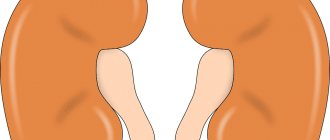The kidneys are a paired organ that performs many functions that ensure a constant internal environment. Among such functions, in particular, are the regulation of ionic, salt and water balance in the body (through the formation and excretion of urine), the regulation of hormonal levels, and the metabolism of various compounds, including toxic ones. The kidneys continue to do their job even after extensive damage (up to 80%-85%).
Conscripts with kidney disease who are deemed fit for military service are at risk of exacerbation of the disease, because the army implies hard physical labor, the possibility of hypothermia and not a hospital diet. Under such conditions, the kidneys can be damaged or frozen. If an aggravation occurs, the conscript is discharged, i.e. will be discharged from the army early.
The problem is that the commission can take quite a long time to clarify all the circumstances, conduct an examination, and confirm the decision with higher officials. Therefore, it is better to have certificates in advance indicating the possibility of exacerbation of the disease - this can save time.
Do they take into the army with chronic pyelonephritis with frequent exacerbations?
Fitness for military service is determined using the Schedule of Diseases, where all possible diseases are indicated, in this case using Article No. 72. A conscript is considered fit for military service with a diagnosis of chronic pyelonephritis if the clinical picture of the disease resolves without impairment of renal excretory function.
Category of suitability for military service with chronic pyelonephritis
Suitability for military service in the case of a chronic form of the disease is determined by the presence or absence of systematic exacerbation, as well as its symptoms.
Suitability categories A and B
are prescribed if the disease has not manifested itself for a long period of time, and additional factors in the clinical picture affect the overall outcome of the medical examination. In addition, category B has a number of restrictions in terms of the general health and physical characteristics of the conscript, as well as limited choice of troops.
Category B
(conscription in wartime) is prescribed when the following clinical factors are identified:
• The clinical picture has a chronic diagnosis, changes in urine tests more than four months after an exacerbation; • Kidney dysfunction provokes chronic arterial hypertension.
It is worth noting that suitability category D
(not fit for military service) occurs when the disease is accompanied by the presence of the following factors:
• The clinical picture is complicated by renal failure; • Creatine level exceeds 176 µmol/l; • Creatine clearance is less than 60 ml; • Amyloidosis; • Attachment of urolithiasis; • Renal vascular pathology.
Clinic and symptoms of the disease
The penetration of infection or microbes into the renal pelvis causes inflammatory processes. This is the essence of pyelonephritis as a disease. Initially, the patient experiences an increase in temperature, which is complicated by the presence of symptoms of fever, such as muscle pain, nausea, dizziness and chills. Kidney disease can be identified by the characteristic sensation of nagging pain in the lumbar region.
If the doctor made a timely diagnosis and the patient approached the treatment procedure with full responsibility, then the exacerbation quickly passes and after completion of the course complete healing occurs. But attempts at self-medication, long waits before going to the hospital, early termination of treatment on the initiative of the patient often lead to the fact that pyelonephritis becomes chronic and becomes a life companion for the young man.
Unfortunately, the lower age limit for this disease is not limited in any way. The pattern of occurrence of attacks cannot be predicted. That is why the young man is interested in whether people with pyelonephritis are accepted into the army? After all, a sudden relapse in a military unit is not so easy to stop, and the patient at this time requires procedures that are provided only in a hospital.
Find out: Are conscripts with bronchitis allowed to serve in the army?
Are they recruited into the army with pyelonephritis in remission?
They can be drafted into the army with a diagnosis of pyelonephritis in remission - the conclusion about suitability is influenced by the duration of remission and additional factors in the course of the disease. Category of suitability for military service with pyelonephritis in remission. The conclusion about the suitability of a conscript for military service with such a diagnosis in remission is determined on the same basis as a diagnosis in a chronic form. If remission continues for several years in a row, the conscript may receive fitness categories A and B, but again, the medical examination takes into account other factors in the course of the disease that affect the general conclusion of the draft commission. If remission lasts a short period of time, and the renal system has undergone pathological changes, then the conscript may be considered unfit for military service (category B, wartime reserve).
What is nephroptosis?
Nephroptosis is abnormal mobility of the kidney and its prolapse. The disease occurs quite often, especially at the age of 20-40 years. Sometimes it leads to lower back pain, blood in the urine, and increased blood pressure. Lower back pain is often attributed to osteochondrosis, and high blood pressure to stress and heredity.
When the kidney begins to descend, it seems to hang on the only support - the artery, which in turn is greatly stretched. When the artery is stretched, the diameter of the artery decreases and the kidney receives less blood. The kidney does everything to get the share it needs, as a result of which blood pressure rises.
When the kidney is prolapsed, urine begins to pass with difficulty. Bacteria that are not washed out multiply and pyelonephritis occurs.
1st degree
– prolapse of the kidney by more than 1.5 lumbar vertebrae. Complaints about general health, fatigue. The descended organ can be palpated through the anterior abdominal wall at the exit (it goes into the hypochondrium).
2nd degree
- prolapse of the kidney over more than 2 lumbar vertebrae. The pain intensifies when standing. The kidney can be felt during palpation, the blood supply is disrupted. During physical activity, sharp and nagging pains begin, after rest the symptoms disappear.
3rd degree
- prolapse of the kidney over more than 3 lumbar vertebrae. Performance decreases significantly, and frequent pain in the kidneys occurs. After physical activity, blood may appear in the urine. The kidney can be easily palpated in a vertical position. Its incorrect location leads to decreased immunity and frequent infectious diseases.
The following complications are possible with the disease:
- Pyelonephritis is a violation of the outflow of urine, a violation of blood circulation in functional tissue.
- Stones in the kidneys.
- Arterial hypertension.
- Hydronephrosis.
The diagnosis can be made by ultrasound lying and standing. The most accurate method is contrast x-ray, which will determine the condition of the blood vessels and the position of the kidney.
Documentary confirmation of the diagnosis of “pyelonephritis” and the actions of the conscript
For a medical examination in such a case, many different medical reports are needed. The conscript needs to visit a venereologist, urologist, infectious disease specialist, and also a dermatologist. In the absence of pathologies of the reproductive and urinary systems, you must provide medical history, results of leukocyturia and bacteriuria, which are not older than one year. Also, the military commissariat must provide the conclusions of the following examinations:
• CT scan; • Ultrasound; • Survey X-ray urography; • Angiography; • Radionuclide methods; • General blood analysis; • General urine analysis.
REFERENCE.
The draft commission may refer the citizen for additional examinations. If a conscript is not fit for military service due to illness (category D), then a military ID is issued, and no additional re-examination is required.
Survey results
You cannot do without an additional examination, especially if you assume that when you undergo a medical examination at the military registration and enlistment office, experts can refer you to a hospital for a detailed diagnosis. To ensure that the examination process is not biased, the doctor should immediately be reminded of the importance of certain indicators that must be recorded in the medical record.
Find out: Do they recruit lunatics into the army?
The picture is aggravated by the development of renal failure. With it, liberation from the army is practically guaranteed. If you try to analyze the survey results yourself, the following information may be helpful. The creatine level should be lower than 176 micromoles per liter. In this case, the clearance does not exceed 60 milliliters. In more accessible language, they will not hire you to serve if:
- After an attack, the composition of urine changes, and these changes are quite persistent and do not go away even 6 months after the attack.
- The acute stage turned into chronic.
The urine should contain leukocytes and bacteria, as an integral sign of pyelonephritis. The main indicators are provided by the urologist after diagnosis, but in addition to a urine test, the military registration and enlistment office will need to provide an ultrasound and x-rays of the kidneys, and a blood test.
The good news is that you only have to go through such troubles once. That is, having once proven the impossibility of serving in the army, the young man will receive a military ID on a permanent basis.
Author's rating
Author of the article
Filatova Oksana
General practitioner. Current member of the VVK.
Articles written
88
Reviews
Reviews of military service with chronic pyelonephritis have mixed opinions. Since everything is individual and depends on the degree of damage to kidney functionality.
My pyelonephritis worsened several times, but the examination did not reveal a chronic form. Therefore, I joined the army like everyone else and served as long as necessary. Everything here depends on the general condition, and you can’t just mow it down.
Maxim, Ivanovo
And my young man had an attack just before the oath, although before that he had never had such symptoms. Now they have given a reprieve and he is undergoing treatment at home.
Irina, Evpatoria
How to appeal a decision on pyelonephritis?
Every conscript has the right to appeal the draft commission in court and is regulated by Article 46 of the Constitution. The conclusion of the members is appealed to higher authorities, which order a control medical examination. The complaint will be considered within 5 working days.
The decision of this body can be challenged in court. Conscription activities will be suspended and a re-examination will be scheduled. You cannot be called up for military service until the judicial investigation is completed.
The complaint must be drawn up taking into account the requirements of the law. There is no need to pay for submission, there are no deadlines for writing.
The decision depends on the results of the analysis and the form of the disease.
Video:
Pyelonephritis is a serious kidney disease. Although women suffer from it more often than men, it is by no means uncommon among the stronger half of humanity. Urolithiasis can provoke the development of pyelonephritis, and in older people the cause is most often problems with the prostate. The disease can develop in childhood, so among older young people approaching conscription age, the question of how compatible pyelonephritis and the army is is popular.
Suitability categories for urolithiasis
The specialists of the military commissariat are guided by the Schedule of Diseases, the results of examinations, and entries in the outpatient card. An additional examination is prescribed to confirm and clarify the diagnosis. The decisive point is the severity of the disease.
If urolithiasis worsens at the time of passing the commission, the conscript is given a deferment of 6 months to complete treatment. The suitability category “G” is assigned, after which a re-examination is carried out and a verdict is rendered. With urolithiasis, category “B” is assigned if there are no exacerbations, functional disorders, stones do not bother you, their size is less than 5 mm. Category “B” or “D” is given for large stones, dysfunction of organs, and frequent exacerbations.











